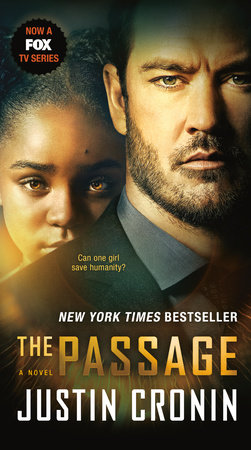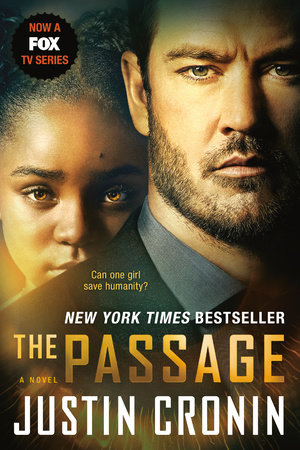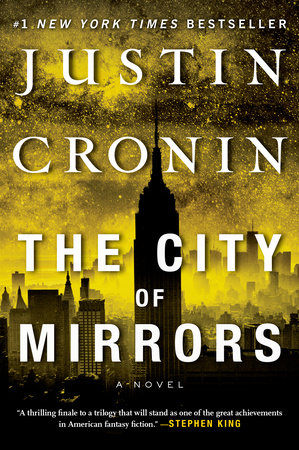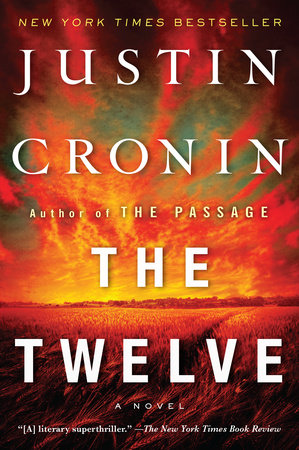Excerpt
The Passage (TV Tie-in Edition)
one
Before she became the Girl from Nowhere—the One Who Walked In, the First and Last and Only, who lived a thousand years—she was just a little girl in Iowa, named Amy. Amy Harper Bellafonte.
The day Amy was born, her mother, Jeanette, was nineteen years old. Jeanette named her baby Amy for her own mother, who’d died when Jeanette was little, and gave her the middle name Harper for Harper Lee, the lady who’d written To Kill a Mockingbird, Jeanette’s favorite book—truth be told, the only book she’d made it all the way through in high school. She might have named her Scout, after the little girl in the story, because she wanted her little girl to grow up like that, tough and funny and wise, in a way that she, Jeanette, had never managed to be. But Scout was a name for a boy, and she didn’t want her daughter to have to go around her whole life explaining something like that.
Amy’s father was a man who came in one day to the restaurant where Jeanette had waited tables since she turned sixteen, a diner everyone called the Box, because it looked like one: like a big chrome shoe box sitting off the county road, backed by fields of corn and beans, nothing else around for miles except a self-serve car wash, the kind where you had to put coins into the machine and do all the work yourself. The man, whose name was Bill Reynolds, sold combines and harvesters, big things like that, and he was a sweet talker who told Jeanette as she poured his coffee and then later, again and again, how pretty she was, how he liked her coal-black hair and hazel eyes and slender wrists, said it all in a way that sounded like he meant it, not the way boys in school had, as if the words were just something that needed to get said along the way to her letting them do as they liked. He had a big car, a new Pontiac, with a dashboard that glowed like a spaceship and leather seats creamy as butter. She could have loved that man, she thought, really and truly loved him. But he stayed in town only a few days, and then went on his way. When she told her father what had happened, he said he wanted to go looking for him, make him live up to his responsibilities. But what Jeanette knew and didn’t say was that Bill Reynolds was married, a married man; he had a family in Lincoln, all the way clean over in Nebraska. He’d even showed her the pictures in his wallet of his kids, two little boys in baseball uniforms, Bobby and Billy. So no matter how many times her father asked who the man was that had done this to her, she didn’t say. She didn’t even tell him the man’s name.
And the truth was, she didn’t mind any of it, not really: not the being pregnant, which was easy right until the end, nor the delivery itself, which was bad but fast, nor, especially, having a baby, her little Amy. To tell Jeanette he’d decided to forgive her, her father had done up her brother’s old bedroom as a nursery, carried down the old baby crib from the attic, the one Jeanette herself had slept in, years ago; he’d gone with Jeanette, in the last months before Amy came, to the Walmart to pick out some things she’d need, like pajamas and a little plastic tub and a wind-up mobile to hang over the crib. He’d read a book that said that babies needed things like that, things to look at so their little brains would turn on and begin to work properly. From the start Jeanette always thought of the baby as “her,” because in her heart she wanted a girl, but she knew that wasn’t the sort of thing you should say to anyone, not even to yourself. She’d had a scan at the hospital over in Cedar Falls and asked the woman, a lady in a flowered smock who was running the little plastic paddle over Jeanette’s stomach, if she could tell which it was; but the woman laughed, looking at the pictures on the TV of Jeanette’s baby, sleeping away inside her, and said, Hon, this baby’s shy. Sometimes you can tell and others you can’t, and this is one of those times. So Jeanette didn’t know, which she decided was fine with her, and after she and her father had emptied out her brother’s room and taken down his old pennants and posters—Jose Canseco, a music group called Killer Picnic, the Bud Girls—and seen how faded and banged up the walls were, they painted it a color the label on the can called “Dreamtime,” which somehow was both pink and blue at once—good whatever the baby turned out to be. Her father hung a wallpaper border along the edge of the ceiling, a repeating pattern of ducks splashing in a puddle, and cleaned up an old maple rocking chair he’d found at the auction hall, so that when Jeanette brought the baby home, she’d have a place to sit and hold her.
The baby came in summer, the girl she’d wanted and named Amy Harper Bellafonte; there seemed no point in using the name Reynolds, the last name of a man Jeanette guessed she’d never see again and, now that Amy was here, no longer wanted to. And Bellafonte: you couldn’t do better than a name like that. It meant “beautiful fountain,” and that’s what Amy was. Jeanette fed and rocked and changed her, and when Amy cried in the middle of the night because she was wet or hungry or didn’t like the dark, Jeanette stumbled down the hall to her room, no matter what the hour was or how tired she felt from working at the Box, to pick her up and tell her she was there, she would always be there, you cry and I’ll come running, that’s a deal between us, you and me, forever and ever, my little Amy Harper Bellafonte. And she would hold and rock her until dawn began to pale the window shades and she could hear birds singing in the branches of the trees outside.
Then Amy was three and Jeanette was alone. Her father had died, a heart attack they told her, or else a stroke. It wasn’t the kind of thing anyone needed to check. Whatever it was, it hit him early one winter morning as he was walking to his truck to drive to work at the elevator; he had just enough time to put down his coffee on the fender before he fell over and died, never spilling a drop. She still had her job at the Box, but the money wasn’t enough now, not for Amy or any of it, and her brother, in the Navy somewhere, didn’t answer her letters. God invented Iowa, he always said, so people could leave it and never come back. She wondered what she would do.
Then one day a man came into the diner. It was Bill Reynolds. He was different, somehow, and the change was no good. The Bill Reynolds she remembered—and she had to admit she still thought of him from time to time, about little things mostly, like the way his sandy hair flopped over his forehead when he talked, or how he blew over his coffee before he sipped it, even when it wasn’t hot anymore—there was something about him, a kind of warm light from inside that you wanted to be near. It reminded her of those little plastic sticks that you snapped so the liquid inside made them glow. This was the same man, but the glow was gone. He looked older, thinner. She saw he hadn’t shaved or combed his hair, which was greasy and standing all whichaway, and he wasn’t wearing a pressed polo like before but just an ordinary work shirt like the ones her father had worn, untucked and stained under the arms. He looked like he’d spent all night out in the weather, or in a car somewhere. He caught her eye at the door and she followed him to a booth in back.
—What are you doing here?
—I left her, he said, and as he looked at where she stood, she smelled beer on his breath, and sweat, and dirty clothes. I’ve gone and done it, Jeanette. I left my wife. I’m a free man.
—You drove all this way to tell me that?
—I’ve thought about you. He cleared his throat. A lot. I’ve thought about us.
—What us? There ain’t no us. You can’t come in like you’re doing and say you’ve been thinking about us.
He sat up straight. —Well, I’m doing it. I’m doing it right now.
—It’s busy in here, can’t you see that? I can’t be talking to you like this. You’ll have to order something.
—Fine, he answered, but he didn’t look at the menu on the wall, just kept his eyes on her. I’ll have a cheeseburger. A cheeseburger and a Coke.
As she wrote down the order and the words swam in her vision, she realized she had started to cry. She felt like she hadn’t slept in a month, a year. The weight of exhaustion was held up only by the thinnest sliver of her will. There was a time when she’d wanted to do something with her life—cut hair, maybe, get her certificate, open a little shop, move to a real city, like Chicago or Des Moines, rent an apartment, have friends. She’d always held in her mind a picture of herself sitting in a restaurant, a coffee shop but nice; it was fall, and cold outside, and she was alone at a small table by the window, reading a book. On her table was a steaming mug of tea. She would look up to the window to see the people on the street of the city she was in, hustling to and fro in their heavy coats and hats, and see her own face there, too, reflected in the window, hovering over the image of all the people outside. But as she stood there, these ideas seemed like they belonged to a different person entirely. Now there was Amy, sick half the time with a cold or a stomach thing she’d gotten at the ratty day care where she spent the days while Jeanette was working at the Box, and her father dead just like that, so fast it was as if he’d fallen through a trapdoor on the surface of the earth, and Bill Reynolds sitting at the table like he’d just stepped out for a second, not four years.
—Why are you doing this to me?
He held her eyes with his own a long moment and touched the top of her hand.—Meet me later. Please.
He ended up living in the house with her and Amy. She couldn’t say if she had invited him to do this or if it had just somehow happened. Either way, she was instantly sorry. This Bill Reynolds: who was he really? He’d left his wife and boys, Bobby and Billy in their baseball suits, all of it behind in Nebraska. The Pontiac was gone, and he had no job either; that had ended, too. The economy the way it was, he explained, nobody was buying a goddamn thing. He said he had a plan, but the only plan that she could see seemed to be him sitting in the house doing nothing for Amy or even cleaning up the breakfast dishes, while she worked all day at the Box. He hit her the first time after he’d been living there three months; he was drunk, and once he did it, he burst out crying and said, over and over, how sorry he was. He was on his knees, blubbering, like she’d done something to him. She had to understand, he was saying, how hard it all was, all the changes in his life, it was more than a man, any man, could take. He loved her, he was sorry, nothing like that would happen again, ever. He swore it. Not to her and not to Amy. And in the end, she heard herself saying she was sorry too.
He’d hit her over money; when winter came, and she didn’t have enough money in her checking account to pay the heating oil man, he hit her again.
—Goddamnit, woman. Can’t you see I’m in a situation here?
She was on the kitchen floor, holding the side of her head. He’d hit her hard enough to lift her off her feet. Funny, now that she was down there she saw how dirty the floor was, filthy and stained, with clumps of dust and who-knew-what all rowed against the base of the cabinets where you couldn’t usually see. Half her mind was noticing this while the other half said, You aren’t thinking straight, Jeanette; Bill hit you and knocked a wire loose, so now you’re worrying over the dust. Something funny was happening with the way the world sounded, too. Amy was watching television upstairs, on the little set in her room, but Jeanette could hear it like it was playing inside her head, Barney the purple dinosaur and a song about brushing your teeth; and then from far away, she heard the sound of the oil truck pulling away, its engine grinding as it turned out of the drive and headed down the county road.
—It ain’t your house, she said.
—You’re right about that. Bill took a bottle of Old Crow from over the sink and poured some in a jelly jar, though it was only ten o’clock in the morning. He sat at the table but didn’t cross his legs like he meant to get comfortable. Ain’t my oil, either.
Jeanette rolled over and tried to stand but couldn’t. She watched him drink for a minute.
—Get out.
He laughed, shaking his head, and took a sip of whiskey.
—That’s funny, he said. You telling me that from the floor like you are.
—I mean what I say. Get out.
Amy came into the room. She was holding the stuffed bunny she still carried everywhere, and wearing a pair of overalls, the good ones Jeanette had bought her at the outlet mall, the OshKosh B’Gosh, with the strawberries embroidered on the bib. One of the straps had come undone and was flopping at her waist. Jeanette realized Amy must have done this herself, because she had to go to the bathroom.
—You’re on the floor, Mama.
—I’m okay, honey. She got to her feet to show her. Her left ear was ringing a little, like in a cartoon, birds flying around her head. She saw there was a little blood, too, on her hand; she didn’t know where this had come from. She picked Amy up and did her best to smile. See? Mama just took a spill, that’s all. You need to go, honey? You need to use the potty?
—Look at you, Bill was saying. Will you look at yourself? He shook his head again and drank. You stupid twat. She probably ain’t even mine.
—Mama, the girl said and pointed, you cut yourself. Your nose is cut.
And whether it was what she’d heard or the blood, the little girl began to cry.
—See what you done? Bill said, and to Amy, Come on now. Ain’t no big thing, sometimes folks argue, that’s just how it is.
—I’m telling you again, just leave.







